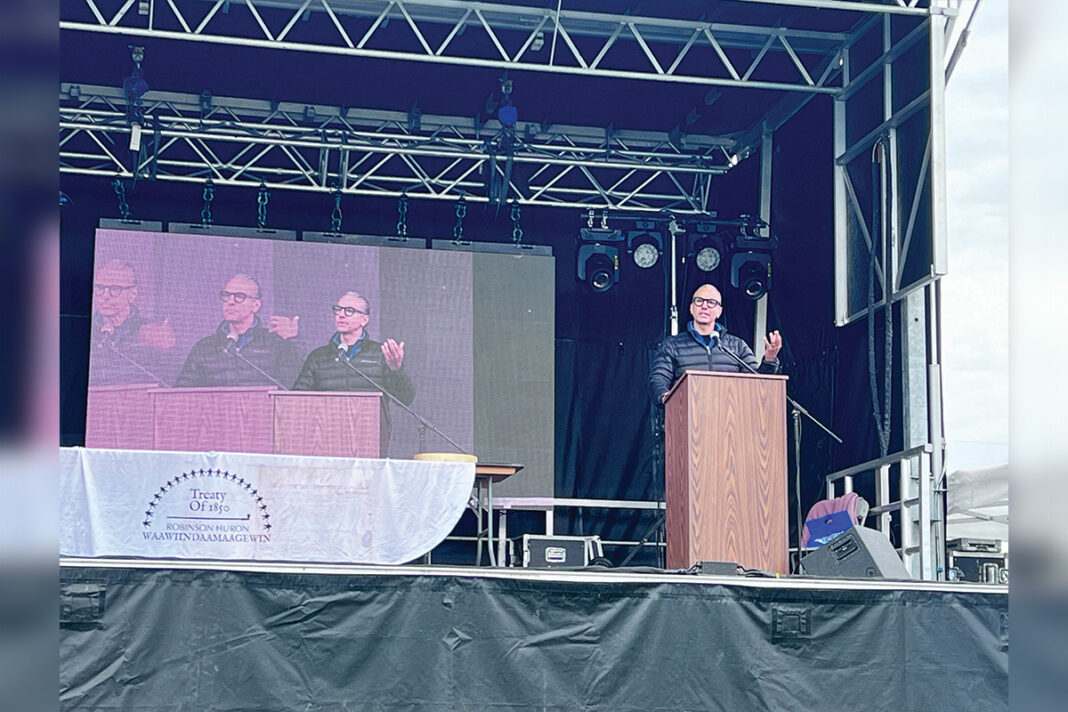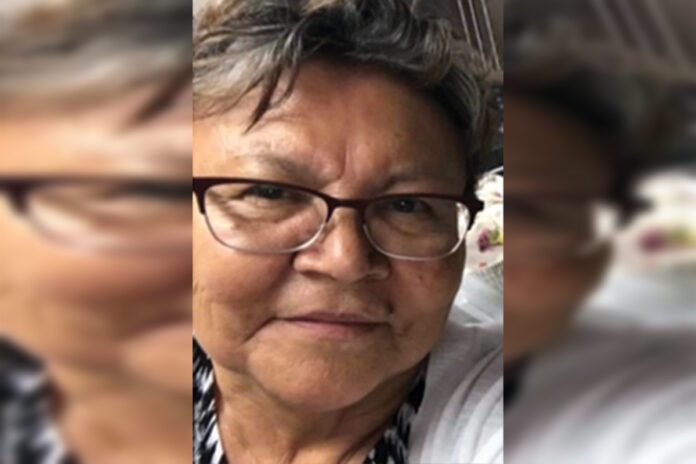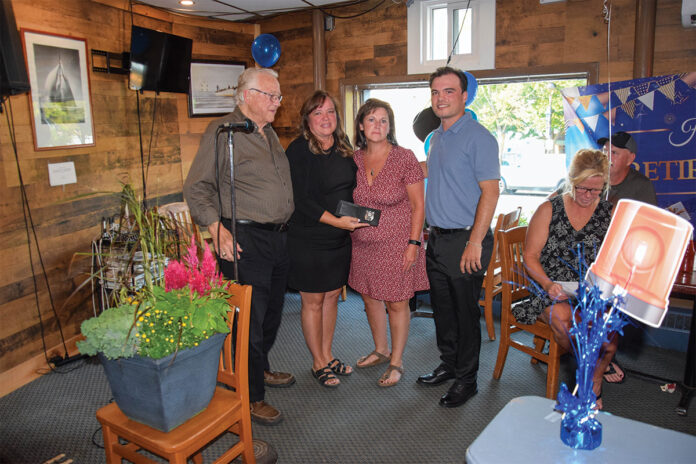Part I of a Series
Keynote speaker stresses the importance of language
EDITOR’s NOTE: Robinson-Huron Treaty celebrated the 174th anniversary of its signing last weekend at an event hosted by the Sudbury-area First Nations. This series will examine and present the highlights of the large gathering.
LIVELY—In a momentous event held at the Anderson Farm Museum, the 174th anniversary of the Robinson Huron Treaty of 1850 was commemorated with a significant gathering that brought together members of the 21 treaty territory communities. Co-hosted by Atikameksheng Anishinawbek and Wahnapitae First Nation, this year’s gathering served as a vital platform for asserting Indigenous sovereignty, reflecting on ancestral wisdom and addressing critical issues related to land rights, economic development and cultural preservation.
The Robinson Huron Treaty of 1850, a crucial agreement between the British Crown and several Anishinaabe (Ojibwe) bands, marked a pivotal moment in the history of Indigenous-settler relations in Canada. The Treaty, which hinged on language barriers to establish terms for land cession and compensation, has long been a source of contention and discussion among the Treaty communities. The recent Robinson Huron Treaty Settlement, which saw 21 First Nations in Northeastern Ontario receive a landmark $10-billion payout for past annuities, has brought renewed focus on these historical agreements.
This year’s gathering follows this historic settlement and was expected to attract over 1,000 participants, including political leaders, Treaty experts, and cultural figures over two days. Among the notable presenters was Anton Treuer, a distinguished Ojibwe scholar and Professor of Ojibwe at Bemidji State University, who has been at the forefront of advocating for Indigenous language revitalization and cultural preservation. He also holds a PhD in History.
Dr. Treuer’s presentation was marked by his powerful reflections on the connections between language, land, and sovereignty. “To access what our people understood—the Anishinaabe way of thinking—you need to access that through Anishinaabemowin, our language,” Dr. Treuer stated. “There is no way to connect to the Indigenous understanding without the Indigenous language.” His remarks highlighted the critical role of language as a key to understanding and preserving Indigenous cultures.
A central theme of the gathering was clarifying misunderstandings about Indigenous consent to the treaties. Dr. Treuer addressed these misconceptions head-on, emphasizing the misinterpretations that have persisted for generations. “There’s a widely held belief that our people consented to the treaties and land sales. That’s incorrect,” he asserted. “We agreed to change the status of certain lands from our exclusive domain to shared use with the newcomers. For example, in the Robinson-Huron Treaty, the English were granted the right to travel through our territory, not ownership of it.”
Dr. Treuer also delved into the broader implications of colonization, describing how it has systematically undermined Indigenous peoples. “Colonization works by getting the colonized to participate as agents of the colonial government,” Dr.Treuer explained. “They took members of one tribe, gave them jobs in the colonial army, and sent them out to vanquish the next tribe. It’s the same with residential schools—hiring Native people to abuse their own.” This perspective provided a sobering look at the long-term effects of colonial systems on Indigenous communities.
Language revitalization emerged as a prominent theme of the anniversary event, with Dr. Treuer underscoring its importance for reclaiming sovereignty. He critiqued the colonial framework that still influences education systems, even those under Indigenous control. “Even as we seek Indigenous control over education, they still give us a rulebook that says we have to teach academic English and follow provincial curricular guidelines,” Dr. Treuer noted. “It’s shaping us to be agents of our own colonization.” His call to action was clear: Indigenous communities need to create their own systems of education and empowerment that are rooted in their cultural heritage.
“Seven generations from now, no one’s going to remember our names, and it doesn’t matter how many books we write or speeches we give or whatever. But if our language lives in their hearts and minds, if our culture lives in their hearts and minds, if they still have our land, if they still have each other, all our strivings today will have been well worth the effort. I don’t pretend that the solutions are easy. In fact, many of the things we do in life are not easy.”
Dr. Treuer’s address included a passionate appeal for Indigenous self-determination. “We need to stop begging for permission or focusing on jumping through colonial hoops,” he urged. “Instead, we should develop our own systems of verification and empowerment, rooted in our culture and language.”
The gathering also provided a platform to examine the economic successes of Indigenous communities, as inspiration – possibly a template – particularly the Mille Lacs Band of Ojibwe in Minnesota. The Mille Lacs Band has become a model of economic empowerment through strategic business diversification and cultural preservation. Dr. Treuer appealed to the audience to invest wisely, saying, “A few generations from now, they won’t remember the financial settlements, but they’ll benefit from what was built with them—things that truly belong to the people.”
The Mille Lacs Band has made significant strides in the gaming and hospitality sectors with the ownership and operation of Grand Casino Mille Lacs and Grand Casino Hinckley. Beyond gaming, the Mille Lacs Band has expanded into various business ventures through Mille Lacs Corporate Ventures (MLCV). This includes investments in hospitality, retail, manufacturing, and technology. The Mille Lacs Band’s focus on self-sufficiency has strengthened their sovereignty by reducing dependence on external funding. Profits from tribal enterprises are channeled into essential services and cultural programs, ensuring the community’s well-being.
The tribe’s efforts also include partnerships with technology companies to develop tools like Rosetta Stone Ojibwe, making the language accessible to learners of all ages. “Our language revitalization programs are integral to our cultural preservation efforts,” Dr.Treuer emphasized. He also spoke about the contract signed with Rosetta Stone, where the tribe retained all rights of the recordings of their people and the profits from the subscriptions to the Ojibwe language program.
The Mille Lacs Band has adopted a holistic approach to economic development, integrating environmental sustainability and community well-being into their business practices. Investments in renewable energy and environmentally friendly practices reflect their dedication to protecting natural resources.
The Robinson Huron Treaty Gathering stood as a powerful reminder of the resilience of Indigenous communities and their reclamation of sovereignty, preservation of cultural heritage and fight for economic self-sufficiency. Dr. Treuer’s insights and the success stories shared at the event underscore the importance of language, leadership, and self-determination in shaping a sustainable future for Indigenous peoples.






